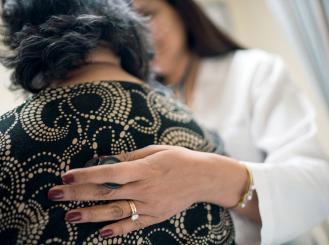Oct 13, 2015
More than 60% of cancers in the United States occur in people age 65 and older, a population that will grow exponentially over the coming years. Yet the evidence base for treating older adults is sparse, as they are currently underrepresented in clinical trials and trials designed specifically for this population are rare.
“Older people living with cancer often have different experiences and outcomes in their treatment than younger patients with cancer,” said ASCO President Julie M. Vose, MD, MBA, FASCO. “As we age, for example, the risk of adverse reactions from treatment significantly increases. Older adults must be involved in clinical trials so we can learn the best way to treat older patients, resulting in improved outcomes and manageable toxicity.”
ASCO is calling for federal agencies and the cancer research community to broaden clinical trials to include older adults. The ASCO position statement “Improving the Evidence Base for Treating Older Adults with Cancer” makes five recommendations:
- Use clinical trials to improve the evidence base for treating older adults.
- Leverage research designs and infrastructure to improve the evidence base for treating older adults.
- Increase U.S. Food and Drug Administration (FDA) authority to incentivize and require research involving older adults with cancer.
- Increase clinicians’ recruitment of older adults with cancer into clinical trials.
- Utilize journal policies to incentivize researchers to consistently report on the age distribution and health risk profiles of research participants.
Developed by ASCO’s Cancer Research Committee and published in the Journal of Clinical Oncology, the position statement also details 16 specific action steps to implement the recommendations. These steps seek to overcome some of the primary reasons for excluding older adults from clinical trials. The statement also encourages researchers to adopt innovative trial designs that would fill knowledge gaps in the treatment of older adults with cancer.
“We need to see clinical trials that mirror the age distribution and health risk profile of patients with cancer,” said Arti Hurria, MD, Director of City of Hope’s Cancer and Aging Research Program and co-author of the ASCO position statement. “ASCO has laid out a multipronged approach to expand the participation of older adults in clinical trials, ensuring that all patients will receive high-quality, evidence-based cancer care.”
Go to the ASCO website to learn more about recommendations and to read the full statement.

